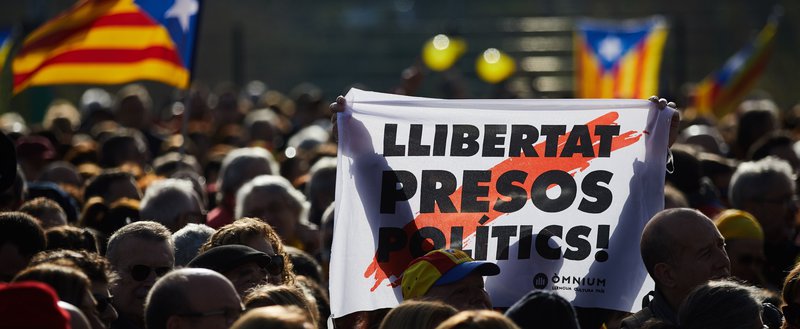Consolidated...what?
Spain spends a lot of money on international campaigns to make it believe that it is a consolidated democracy. However, it is increasingly resembling a dictatorship. In the elections to the Parliament of Catalonia of December 21, 2017, the pro-independence parties won despite the harsh campaign by Spain. But it used its courts to prevent the appointment of a president who had been elected at the ballot box. Lately, it has resorted to an administrative body, such as the Central Electoral Board, to remove president Torra for defending the political prisoners and not submitting to Spain’s arbitrary dictates, finally leading to new elections.
On the other hand, in March, 4.5 million euro bail was imposed on two former high officials of the Catalan government in 2017 for allegedly spending public money on the October 1 referendum. This was when bail had already been placed in another trial for the same reason. Yet, the then Spanish finance minister said that the Catalan government had not spent a penny on the referendum. And he could guarantee it because the Catalan government’s finances were taken over by Madrid, which remains to this day. In addition, it must be remembered that the Kingdom of Spain ratified the Charter of the United Nations and the international covenants where the right of peoples to self-determination is enshrined, and the Spanish Constitution in Articles 10.2 and 96 obliges respect for ratified international agreements.
All this contrasts with the news published in newspapers such as The Telegraph in March about €65 million in supposed commissions paid to Emeritus King Juan Carlos and hidden in tax havens. Still, no Spanish court has yet investigated it, and in the Spanish parliament the majority political parties, both right and left, blocked the proposed inquiry committee.
And not only have the Spanish courts engaged in lawfare against Catalan independentists, but also the new Spanish government has continued the project of liquidating Catalonia’s already meagre autonomy. Thus, the new government took advantage of the Covid-19 crisis to snatch up the Catalan government’s health and public safety responsibilities, while the Spanish government did not implement the measures advocated by most experts in time.
In this context, despite the Spanish diplomatic pressure in recent years, numerous international and parliamentary bodies have been critical of Spain in relation to Catalonia. Thus, in March, the United Nations Special Rapporteur on minority issues, Fernand de Varennes, after visiting Spain, made an extremely critical report. The report recognises that in Spain, Basque and Catalan are national minorities to be treated as such. He “received reports of an apparent increase in hate speech, vilification, vandalism, physical threats and even assaults against members of the Catalan minority” and explains that “some reports suggest that authorities are not sufficiently responding to or prosecuting these allegations”. He also states that “non-violent political dissent” should not be prosecuted on “criminal charges”.
Despite the Spanish repression in Catalonia, the independence movement is alive. Thus, at the end of February, about 200,000 people gathered in Perpignan for an event promoted by the Council for the Catalan Republic. The Catalan Republic was proclaimed on October 27, 2017, and it is not yet effective, but often the processes of national liberation is not linear. It should be remembered that Estonia proclaimed independence in 1988, but the restoration of Estonian independence did not take place until 1991.

